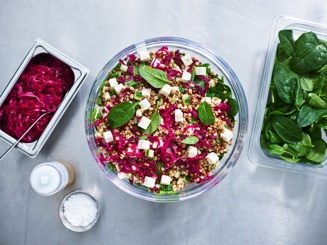
In general, protein can be divided into two main groups, namely animal-based and plant-based. Lentil protein belongs to the latter and can be further categorised as belonging to the legume family. Read more about the different categories of plant-based protein.
Using lentils for a plant-based diet is a popular choice, and if you want to explore more plant-based sources, be sure to check out our articles about:
You can also read about protein sources for vegetarians.
Are lentils high in protein?
Yes, lentils are high in protein. In general, raw, uncooked lentils contain about 26.2 grams of protein per 100 grams, and protein makes up about 30.4 % of the total energy value. The exact amount varies depending on the specific type of lentils, but common to all is their versatility, making them easy to use in the kitchen.
Lentils are often used in soups, curries, salads, and stews, and thanks to their texture, they can easily work as a meat substitute for burgers and the like. Keep reading to learn more about the protein content of different types of lentils.
Red lentils
Red lentils are especially popular in Indian and Middle Eastern cuisines. They have a mild, slightly sweet, and nutty flavour. When cooked, they become soft and mushy as they absorb the flavours of the other ingredients, which is why they are frequently used in soups and curries to add a lovely creamy consistency. Cooked red lentils contain 22.5 grams of protein per 100 grams, and the energy contribution of protein is 28.8 % of the total value.

Green lentils
Originally from the French region Le Puy, green lentils are also known as Puy lentils. Unlike red lentils, the green ones maintain their firm texture even after cooking. Because of that, they are generally used to give a mild bite to salads, side dishes, or lentil-based main courses.
Green lentils have a strong, earthy flavour with subtle notes of pepper and spiciness. In their raw form, they hold 20.5 grams of protein per 100 grams. The energy contribution from protein is 26.9 % of the total energy value.
Black lentils
Black lentils, also known as beluga lentils, have a rich, earthy flavour accompanied by a slightly nutty undertone. With their strong taste, they pair well with bold spices and ingredients. They hold their shape well when cooked and become firm and slightly chewy, which makes them a good alternative to meat-based burgers. Of course, they can also be used for salads and lighter servings.
100 grams of black lentils contain 22.5 grams of protein, and 29.6 % of the total energy value comes from protein.
Yellow lentils
Yellow lentils are known for their mild flavour and vibrant color. They cook quickly and tend to become soft, making them ideal for creamy soups, purees, and curries.
Yellow lentils contain approximately 24.5 grams of protein per 100 grams, contributing 27.5% to the total energy value.
Brown lentils
Brown lentils are a versatile choice, often used in stews, salads, and side dishes due to their hearty texture and earthy flavour. They maintain their shape well during cooking, making them suitable for dishes that require a firmer bite.
Brown lentils offer around 23 grams of protein per 100 grams, and 28% of the total energy value.
Which lentils have the most protein?
The protein content in lentils varies from type to type, but generally, they are all high in protein. As mentioned above, yellow lentils contain 24.5 grams of protein per 100 grams. Brown lentils contain 23 grams of protein per 100 grams. Red and black lentils both contain 22.5 grams of protein per 100 grams, while green lentils contain 20.5 grams per 100 grams.
The values above are raw lentils, so note that the nutritional composition might change when you prepare them.
Is lentil protein a complete protein?
No, lentil protein is not a complete protein. However, you can combine lentil protein with other types of plant-based or animal-based proteins to form a complete protein.

Related Articles
Want to understand different types of protein? Here's everything you need to know:









































